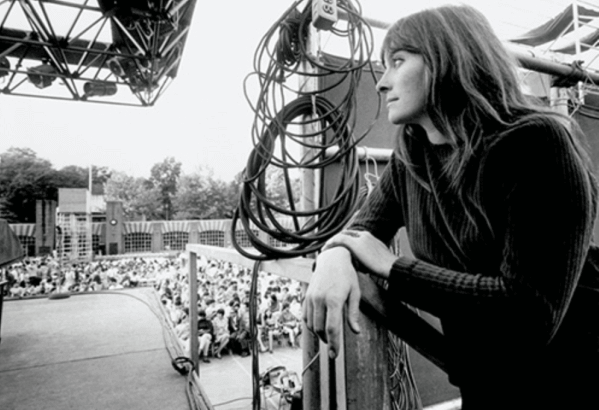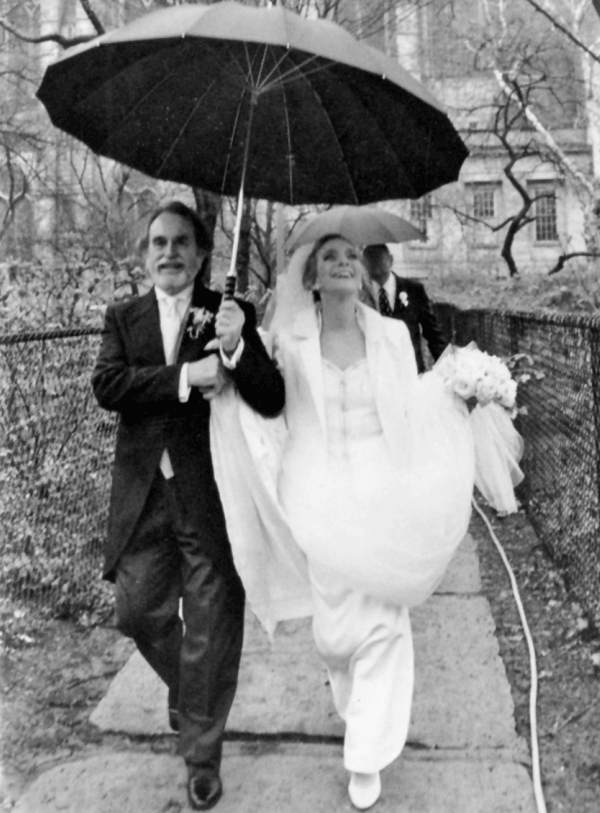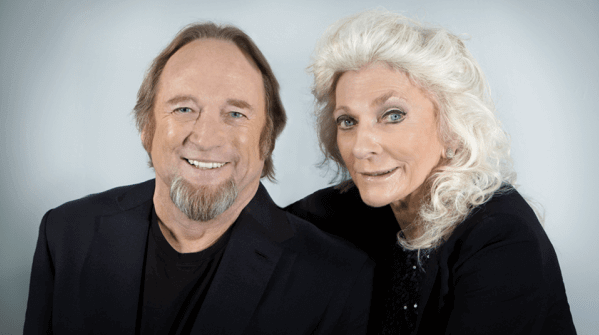Judy Collins is one of the most quietly significant women in our culture. For more than 50 years she has witnessed, shaped, and musically narrated key moments in our history.
Her influence in the music world has been enormous. She starred in the folk music revolution and its consequential widening into quality rock. Plus, she’s been a great nurturer of talent. Bob Dylan crashed at her New York apartment when he was trying to get a break on MacDougal Street. She did more to launch the careers of Leonard Cohen and Joni Mitchell than almost anyone else. Cohen came knocking on her Manhattan apartment door over 52 years ago saying, “I’m Leonard and I want to sing your songs, but I can’t sing and I can’t play the guitar. After she made his “Suzanne” a hit, she helped him develop his own performing career.
She did more to launch the careers of Leonard Cohen and Joni Mitchell than almost anyone else.
Her 1967 mega-hit “Both Sides Now,” which Joni Mitchell wrote, was an anthem for a new kind of young woman: a principled and thoughtful but freely sexual bohemian who embraced the idea of being an adventurer with resonating dignity.
She’s also known for her activism. During Freedom Summer in 1964, she marched with Fannie Lou Hamer, the prominent civil rights activist from Mississippi. She was an early 1970’s feminist—huddling in talks with Gloria Steinem and Marlo Thomas—and has stayed true to those goals ever since.
Energy and Optimism After Tragedy

Judy waiting backstage in Central Park in 1966.
She is also so much more. She has been a friend of mine for several years, and I have rarely met anyone who is so full of a positivity that defies an anguished early history: She tried to commit suicide as a young teenager in her native Colorado. She suffered decades of alcohol abuse as a young woman and years of severe eating disorders. She briefly lost custody of her one child, Clark, in an early moms-shouldn’t-work-or-be-in-therapy court battle, and then, most tragically, she lost him to suicide in 1992, when he was 33. Yet everything about her vibrates energy and optimism.
At 79, she is as constantly working and traveling a performer as any half her age.
Then there’s this: At 79, she is as constantly working and traveling a performer as any half her age. She’s a fixture of New York City’s wide swath of culture—performing yearly at the elegant Café Carlyle (she just completed a week there) and, on New Year’s Eve, at the soaring Cathedral of St. John the Divine. She gives 150 out-of-town—and often-out-of-country—concerts a year. She’s put out three albums in the past couple of years alone. One, Silver Skies Blue, with Ari Hest, was a Grammy nominee.
Judy Collins Now: How She Inspires
How does Judy do it? And how can we learn from her? I asked her and she answered.
Q: Two years ago you put together an album of duets, Strangers Again, and you got partnerships from Jeff Bridges, Jackson Browne, Willie Nelson, Michael McDonald, Jimmy Buffett—all male peers. You approached them.
JUDY: Yes, it was a great reunion with a lot of those guys. And I’d never met Jackson before—he’s so bright and interesting and fun, and loves to laugh—so that was great. The only one who had to say no to me was Randy Newman; he said his voice was shot.
Q: So it was the guys, all flocking to join you. That certainly disrupts the myth that “older” women are more vulnerable and less marketable than older men.
JUDY: It’s a ridiculous myth! It’s just not true that women have to get more vulnerable as they get older. Look at Lily Tomlin and Jane Fonda, Judy Dench and Helen Mirren! They haven’t slowed down or lost their confidence.
I don’t believe that age has anything to do with your spirit or attention or talent or determination.
I don’t believe that age has anything to do with your spirit or attention or talent or determination. It’s wrong to think of age, especially for women, as an impediment. People don’t get sidelined because of their age or physical condition—or gender. They get sidelined because something in them says, “I’m pulling over.”
SW: And it must have been fun to do those 50 concert dates last year with Stephen Stills, with whom you recently released the album Stills and Collins: Everybody Knows.
JUDY: With more to come this year!
SW: Stephen was besotted by you in the early 1970s. His song “Suite: Judy Blue Eyes” was what every hippie girl wanted from the most handsome, caddish boy: adulation. It’s great that you’ve stayed friends over the decades.
JUDY: We have. It’s been lots of fun. It’s kind of like being in couples’ therapy after 50 years!
The Source of Her Strength

Judy on her wedding day to Louis Nelson in 1996.
SW: Even though you’ve been through so many tragedies and challenges, you present as if you’ve never not been emotionally healthy. How is it that you have been able to get better as you’ve gotten older?
JUDY: I’m an optimist naturally, and I got that from my father, who was a singer, performer, and radio host. He was blind from the age or four and he was an alcoholic as an adult, but he did not whine—ever. My sister said to me recently, “You know, no matter how much Daddy drank at night, he always woke up smiling.” He’d say to me, ‘You have to plan time for your work. You have to practice!’” [Judy was a child pianist and guitarist.] And when, at 14, I tried to kill myself [by taking pills], I got this letter from him, saying, “You have something that’s very valuable. You have no right to take it away from the world.” My parents demanded a great deal from me, and maybe that’s why I feel comfortable being challenged. Also, as the oldest of five siblings, I knew I couldn’t fall apart—my siblings depended on me! When I survived that early overdose and got that letter from him, that told me: “OK! Life? Let’s get on with it!”
SW: Of all the difficulties you went through, the hardest had to be your son’s death, at 33. How did you get over that?
JUDY: Women in similar positions helped me. After Clark died, I started to slip into that ferocious toxic horror of being a suicide survivor—it’s a horrible place to be.
I made it through a minute at a time. I finally got back to the piano and sobbed my way through practicing and writing again.
But Joan Rivers [whose husband Edgar Rosenberg had committed suicide] called and said, “You cannot stop working! If you stop working, you are not going to get over this!” I took her words to heart. And I had another friend, Iris, who is a psychologist, and I would call her in the middle of the night and talk for hours.
I made it through a minute at a time. I finally got back to the piano and sobbed my way through starting to practice and write again. I also wrote a book about it, Sanity and Grace. Writing can save you!
As an alcoholic [Judy has been a passionately devoted AA member and sponsor for decades] I couldn’t take anti-depressants or any drugs at the time, so it made dealing with it all the more challenging. But I had Louis [Louis Nelson, her husband, a designer, to whom she wasn’t yet married]. Sometimes when these things happen, people walk out; they can’t take it. But Louis stayed the course. And being with compassionate friends did so much to help me.
SW: You are a good friend. I’ve experienced that in you. While touring 150 days a year, how do you keep up with your friendships?
JUDY: I refuse not to do so. Just as you have to have support systems, you have to be part of support systems. I keep in touch with my friends while I am on the road. I know people who go on tour and then say, in an overwhelmed voice, “I’ve just come home and I have four hundred messages to answer!” I think, Why wait to answer them? There’s email, there’s Skype, there’s the phone. There’s no reason not to keep in touch with friends when you’re on the road. My life doesn’t stop because I’m in Florida or Japan.
Look. We’re living in a very toxic political environment. Especially now, we need our friends. For a long time I’ve known that emotional generosity is so important. Even decades ago, when Gloria and Marlo and I were in consciousness raising groups, we had already succeeded. So we talked about helping women who weren’t making enough money, women stuck in rotten marriages. Helping women find their courage.
We’re living in a very toxic political environment. Especially now, we need our friends.
I cannot take argument and negativity. Maybe it’s because of my history and how I’ve learned to overcome it. One day, many years ago, before I met my husband, I said to my then-therapist, “I think I’m interested in this guy,” who was edgy and a little negative. And she said, “Fine. But you might drink over him.” She was right. I’d had a lot of hostility and rage, and I knew, when I made the commitment to stop drinking, that negativity was dangerous.
SW: AA is very important to you,
JUDY: Very important. So much of our negative behavior comes down to addiction. My years of bad food habits were addiction. Whether it’s morbid obesity, bulimia, or anorexia, to me, the whole idea starts with addiction.
SW: You wrote your recent book, Cravings: How I Conquered Food, to send this message.
JUDY: Yes, and here’s another rule I live by: I wrote the book for myself—because I wanted to tell the story about how—after trying diet after diet, I conquered food by understanding my addiction to sugar and grains, flour and wheat. I carry pre-packaged food that doesn’t contain those ingredients on the road with me. I didn’t care if anyone read it (fortunately, they did). It was a story I had to tell. Doing things for yourself keeps you vital.
The Current Moment

Judy and Stephen Stills, who still make music together.
SW: How do you keep up your health and stamina?
JUDY: I have a treadmill and an exercise bike at home. On the road, I don’t go to hotel gyms, but I do jog. I get acupuncture and I have massages, and I am always going to nutritionists and naturopaths. But do you know what the biggest boon is: Keep doing what you believe in. All my music and books have come from that impulse. Don’t let anyone tell you not to do something you want to do. As I said, I’m lucky—I’m an optimist.
And I’m lucky in other ways, too. I have a wonderful husband.
SW: Yes. Louis is warm, supportive, interested in people—and a very talented designer, who, among other things, designed the Korean War Museum in Washington D.C.
Mid-April is a time of anniversaries for me. 40 years with my husband and 40 years sober.
JUDY: In a few days we’ll have been together 40 years—I can’t believe that! And, also in a few days, I’ll have been sober for 40 years. Mid-April is a time of anniversaries for me.
SW: Is there something about the current moment that bothers you?
JUDY: Yes. I think the rule of law is being challenged and assaulted every day, in every conceivable way. By this administration, and in the way that the insults to people who are different—who are disabled or black, for example—are being tolerated. But also by a sense of vigilantism. I even wonder a bit about the #MeToo revolution. One day you’re conducting a symphony or are a member of Congress and the next day you’re finished. There’s no grand jury, no exploration of the facts. I’m not at all saying we should coddle perpetrators of sexual abuse of women, but how can we assure due process and guarantee that this attitude is not going to slip over and suddenly invade other areas of our democracy? We have to be careful.
On the other hand, look at those Parkland kids! Aren’t they wonderful? I’m so proud of them and impressed with them. It makes me realize that we did the right thing in the ‘60s that we didn’t fail. And now they’re taking the revolution forward.




















0 Comments